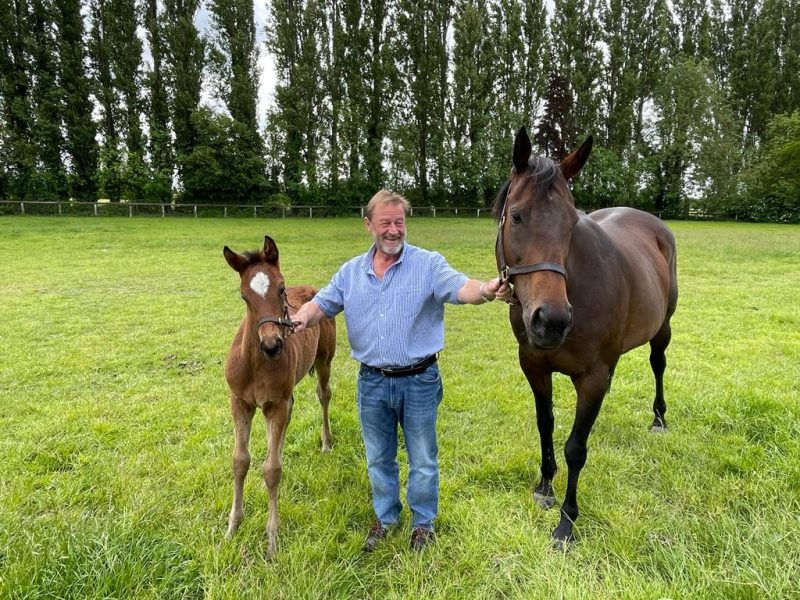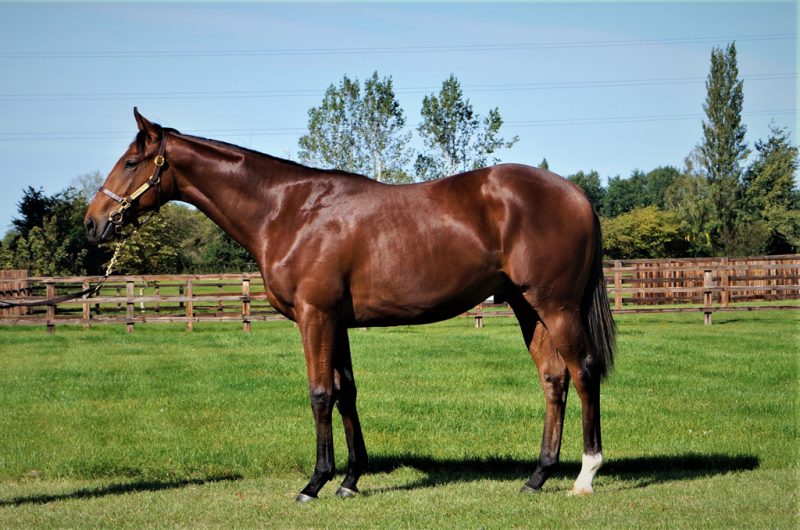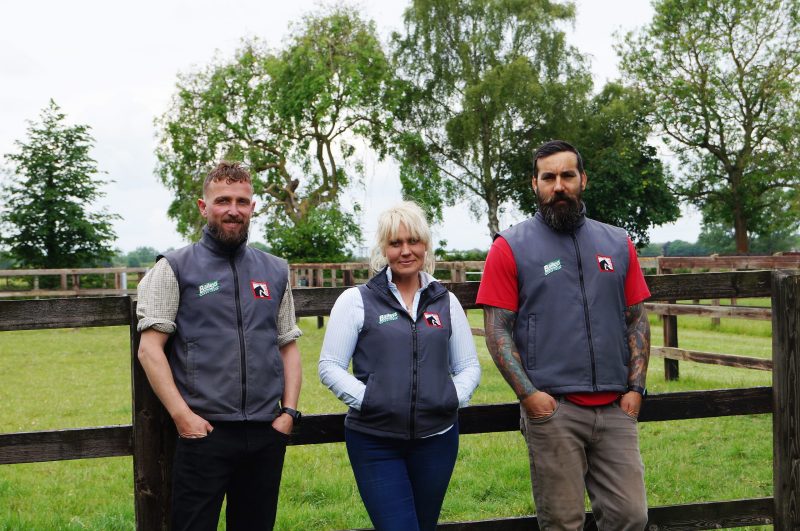Strawberry Fields forever
James Thomas talks to Gary Robinson, breeder of the Derby winner Desert Crown
“I try to pretend that I don’t know what I’m on about most of the time!” says Gary Robinson as he discusses his breeding operation at Strawberry Fields Stud.
That pretence has presumably become a lot harder to maintain since the farm, which is situated in the village of Teversham on the edge of Cambridge, produced this year’s impressive Derby winner Desert Crown.
Robinson jokes: “I’m not sure where I will go with my breeding now, I might pack it in, I don’t think there are any races bigger than the Derby left to win!”

Gary Robinson with Desert Berry
Robinson wasn’t born into a racing family, much less stud ownership, so says that Desert Crown’s emergence feels like “vindication” for all the time, money, effort and emotion he has invested into Strawberry Fields and its equine residents.
He began learning his trade at the age of 12 when, during a spell working for a veterinarian, he tended to a group of horses close to his family’s council house in the Fenland town of Whittlesey.
“I used to look after them and I didn’t know they could be dangerous so I just fell in love with them,” he recalls. “And so everywhere I went after that, I used to draw a picture of a horse.”
His time working with the vet was confined to his youth and instead Robinson pursued employment in the design and technical engineering sector, and with considerable success. As his career progressed he indulged his love of the thoroughbred by collecting Schweppes calendars and other equine keepsakes, but says it was “always in the back of my head to have a horse of my own.”
Robinson’s first taste of ownership came in 2003 when he and a few like-minded friends from Whittlesey set up the The Four April Fools syndicate, who owned Absolutely Soaked, a modest daughter of Alhaarth trained by Dr Jon Scargill.
His string has grown exponentially since, and in the last five years a double-figure number of trainers – including the likes of Brian Ellison, Chris Dwyer, Chris Wall, Jessica Macey and Sir Mark Prescott – have saddled runners who have carried Robinson’s distinctive white silks with a red hollow box.
However, perhaps only half jokingly he says: “I wasn’t ever really interested in horseracing, in fact I’m still not really that interested in horseracing! I’m more interested in the animal itself, so my real passion is breeding.”
The origins of Strawberry Fields
Of course, breeding requires land, and so in 2011 Robinson took his first small step towards producing Desert Crown by purchasing Brickfield Stud in Exning.
He says: “Originally I couldn’t afford anything, but I had a good bank manager and he helped me buy Brickfields and then we spent nearly all the money we had trying to make that work.”
The late Basil White, who passed away in June 2016 at the age of 92, was a pivotal figure as Robinson developed his breeding interests, and it was from him that the mantle was taken up at Strawberry Fields and Fernleigh Farm.
“I had an old partner called Basil White,” explains Robinson. “He was a proper horseman, he was a bit old school but he always had a good eye for a horse and we became good friends.
“When he passed away he left me his farm and said ‘you look after it’, so I’ve been doing that for the last few years. I think we had about 40 horses around at the time [of taking the farm on] but we’ve slowly rehomed those and updated the farm and kept everything going from there.”
Despite his relatively extensive thoroughbred property portfolio, Robinson remains unafraid to roll his sleeves up, saying: “I’m not the Aga Khan or Oppenheimer or the Rothschilds or anything like that. I’m still the man who digs the holes!”
Robinson’s day job is as the managing director of RWS, a company specialising in ballistic and bomb protective products. He notes there are clear parallels between the skills he requires professionally and for his passion for breeding, although he adds that sometimes the heart rules over the head.
“There’s the technical side of the horse with aspects like biomechanics,” he says. “And I also wrote a strategic plan when I bought the stud, which very rarely anybody does in this industry. That was about ten years ago and I filled in all the boxes with what you needed and how long it would take, and then you build into the plan all the things that can go wrong. And after that the passion takes over and all the planning goes out the window!”
There is a commercial aspect to the Strawberry Fields operation, with Robinson due to retain the fillies he breeds while the colts will head to public auction. But he stresses that a big part of his strategic plan accounts for the aftercare of his horses once they go beyond the racing or breeding stages of their lives.
“When I pack it in, the idea is that they’re all looked after,” he says. “That side of it is massive and people don’t realise you’ve got these horses for the rest of your life. So a big thing is to get enough funds together so they can be looked after until they leave this world. That requires a bit of planning ahead, but that’s where my engineering brain kicks in as that’s all about planning.”
Despite the strategic plan occasionally going out of the window, Desert Crown stands as a shining example of just how well Robinson’s ideas are coming together.
He says at one point he owned around 700 books on horses, has sat two Thoroughbred Breeders’ Association breeding courses, and has tried to learn from each and every one of the great and good he has bumped into during his time in racing.
He now has theories on everything from mating plans to bone density and, with the help of pedigree consultant Alastair Nicolson, has set about using the knowledge he has amassed to produce high-class equine athletes.
“We put so much effort into it,” says Robinson. “We sit and discuss mating plans for probably three months before we get to the coverings. We have a ratings system that we go through and that assesses things such as the female line, masculinity, femininity. We also work on seven generation pedigrees, not just on what the catalogue page says.
“We’re trying to bring that female line back through and hopefully get the balance correct.”

Desert Berry as a yearling ahead of his date at Tattersalls October
Robins certainly struck the right balance with Desert Crown, who was the result of a mating between Strawberry Fields’ budding blue hen Desert Berry and Newsells Park Stud resident stallion Nathaniel.
Robinson’s first involvement with Desert Crown’s family actually came with the colt’s second dam Foreign Language from whom he bred a couple of offspring before selling the mare when she was in-foal to Poet’s Voice in 2013.
It is easy to see why he purchased Foreign Language, a Juddmonte-bred daughter of Distant View, as she is out of the Listed-winning Binary and is a sibling to Binche, dam of the four-time Grade 1 winner Proviso and Prince of Wales’s Stakes hero Byword.
Getting into the family
Robinson didn’t breed Desert Crown’s dam Desert Berry, a daughter of Foreign Language, but instead acquired her privately. The purchase proved a shrewd bit of business as not only has she produced this year’s Derby winner but Archie McKellar too, who won a Kempton novice for Ralph Beckett before he transferred to Hong Kong, where he was renamed Flying Thunder and won the Group 3 Premier Cup.
Desert Berry, who carried the colours of Basil White’s wife Alexandra, also won one of her three starts during her time in training in Newmarket with Chris Wall, but Robinson explains she had a far more dramatic claim to fame prior to producing her talented offspring.
“When Chris had her she got free, went through the town and went through the front window of a Turkish restaurant!” he says. “So we’ve been on television because of her before, but for something completely different. That was probably ten years ago now. Perhaps that was an omen!”
Having survived that ordeal Desert Berry retired to the Strawberry Fields paddocks and set about transferring her toughness to her offspring. Robinson says that the quality possessed by Desert Crown, who carries the familiar colours of Saeed Suhail having been sold to Blandford Bloodstock for 280,000gns at the Tattersalls October Book 2 Yearling Sale , were evident from an early stage.
“Desert Crown was an outstanding looking individual and when he progressed to about 12 months old he really started to look like a Classic horse,” says the breeder.
“You can tell once they get to about three months whether they’re going to be alright or not. The others are starting to look like that as well, they’re all Classic looking. I’m not interested in speed, I’m interested in producing Classic horses. It’s an expensive way of doing it but that’s the ‘real way’.”
Desert Berry also has a two-year-old Al Kazeem filly, a yearling colt by Study Of Man and a Nathaniel foal.
“She’s a monster,” Robinson says of the Al Kazeem. “She should run as a two-year-old and she’s lovely, she’s a beautiful horse.
“The mating to Study Of Man was an ‘A rating’ so that should produce something as good, if not better, than what we’ve already got and the colt already looks like a powerful horse.”
Having followed his strategic plan this far, Robinson is hopeful that Desert Berry’s brood is just the start of a new era of success for the Strawberry Fields team, which includes stud manager Stuart Millar, estate manager Gabor Nadas and the yearling manager Jodie Allen.

The Strawberry Fields team
“Stuart, Jodi and Gabor do the hard work behind the scenes, and our expert advisors also contribute to making a good horse.”
“And it’s not just Desert Berry; I think we’ve probably got three or four mares who could do something special.”
Among those are the likes of Yaqeen, a Listed winner whose five black-type siblings include three-time Grade 1 scorer Grand Couturier. The daughter of Green Desert is in-foal to Study Of Man. The three-time winner Capla Berry and the well-related Thraya Star are in-foal to Territories, while Desert Berry and her daughter Rose Berry are both in-foal to Nathaniel.
There are other exciting plans afoot too, as Robinson has just upgraded the facilities across the road from Strawberry Fields to allow a string of racehorses to be trained from the 20-plus box yard.
“I don’t know if I want the hassle factor of training myself because I still have to do other things,” he says. “I’ve still got a farm that I run and I don’t want to finish up shattered and not enjoying it. So I’d probably hire a private trainer, but run it as more of a hobby. If you’re running your own fillies or horses for a few friends it wants to be fun rather than intense.”
Robinson has plainly put in plenty of hard yards to reach this point, but with young blood and new life coming to the fore, as well as a Derby winner in the stud book, Strawberry Fields empire set for the next phase of its evolution, he has an awful lot to look forward to.
“It’s a proper race,” he says of the Derby. “It’ll be good for everybody from where I used to live in Whittlesey.”